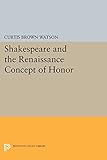Shakespeare and the Renaissance Concept of Honor / Curtis Brown Watson.
Material type: TextSeries: Princeton Legacy Library ; 2358Publisher: Princeton, NJ : Princeton University Press, [2015]Copyright date: ©1960Description: 1 online resource (490 p.)Content type:
TextSeries: Princeton Legacy Library ; 2358Publisher: Princeton, NJ : Princeton University Press, [2015]Copyright date: ©1960Description: 1 online resource (490 p.)Content type: - 9780691625904
- 9781400878956
- 822.33 22
- PR3007 .W3eb
- online - DeGruyter
- Issued also in print.
| Item type | Current library | Call number | URL | Status | Notes | Barcode | |
|---|---|---|---|---|---|---|---|
 eBook
eBook
|
Biblioteca "Angelicum" Pont. Univ. S.Tommaso d'Aquino Nuvola online | online - DeGruyter (Browse shelf(Opens below)) | Online access | Not for loan (Accesso limitato) | Accesso per gli utenti autorizzati / Access for authorized users | (dgr)9781400878956 |
Frontmatter -- Preface -- Contents -- Introduction -- Part I. The Renaissance Concept of Honor -- Chapter 1. The Concept of Honor from Plato to the Renaissance -- Chapter 2. Part 1. The Aristocratic Class Structure of the Renaissance -- Chapter 3. Points of Conflict between Christianity and the Pagan-Humanist Ethics -- Chapter 4. Honor as Public Esteem -- Part II. Shakespeare's Use of the Renaissance Concept of Honor -- Chapter 5. Shakespeare and the Aristocratic Class Structure of his Age -- Chapter 6. Shakespeare and the Renaissance Concept of Honor -- Chapter 7. Shakespeare and the Renaissance Concept of Honor (continued) -- Chapter 8. Shakespeare's Ambivalence in Regard to Christian and Pagan-Humanist Values -- Chapter 9. Shakespeare's Ambivalence in Regard to Christian and Pagan-Humanist Values (continued) -- Chapter 10. Honor as Public Esteem -- Chapter 11. Honor as Public Esteem (continued) -- Epilogue -- Appendix -- Bibliography -- Index
restricted access online access with authorization star
http://purl.org/coar/access_right/c_16ec
Presenting a background study of honor, the author compares ancient concepts with the sympathetic restatements of them that appeared during the Renaissance. He places Shakespeare's plays in the context of these Renaissance ideas, pointing up the sharp conflict between Christian morality and the revived pagan humanism. He demonstrates by pertinent evidence from the plays that Shakespeare favored humanist values over Christian values.Originally published in 1960.The Princeton Legacy Library uses the latest print-on-demand technology to again make available previously out-of-print books from the distinguished backlist of Princeton University Press. These editions preserve the original texts of these important books while presenting them in durable paperback and hardcover editions. The goal of the Princeton Legacy Library is to vastly increase access to the rich scholarly heritage found in the thousands of books published by Princeton University Press since its founding in 1905.
Issued also in print.
Mode of access: Internet via World Wide Web.
In English.
Description based on online resource; title from PDF title page (publisher's Web site, viewed 30. Aug 2021)


